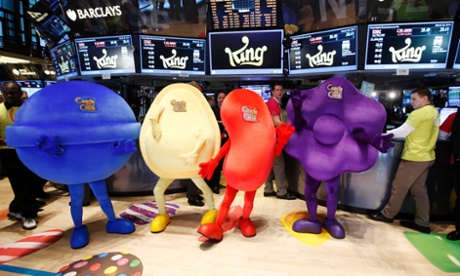
Wall Street proved immune to Candy Crush’s charms Wednesday as shares in King Digital, the company behind the mobile gaming phenomenon, dropped 16% on their debut.
The most highly valued British company to emerge from the new technology boom, King’s initial public offering on the New York York Stock Exchange ran in to trouble from the start.
Minutes after chief executive Riccardo Zacconi – joined by fellow directors and two mascots dressed as a carrot and a boiled sweet – rang the opening bell, traders on the open market tore into King’s valuation. The company had priced its shares at $22.50, they ended the day at $19, and were continuing to dip in after-hours trading.
Ahead of the sale, analysts had compared the 11-year-old company to games developer Zynga, maker of FarmVille and Words With Friends, whose shares are currently worth half their 2011 float price. One, Scott Sweet of IPO Boutique, told Marketwatch that King was a “one trick pony” and the company itself had admitted to investors the possibility that it’s fortunes are currently closely tied to the future of Candy Crush.
"Investors are clearly finding the price tag a little high for a company that relies on most of its revenue from one albeit popular game," said analyst Jasper Lawler at CMC Markets.
It is unusual for tech companies to perform poorly on the first day of trading. The seven underwriting banks – JP Morgan, Credit Suisse, BofA Merrill Lynch, Barclays, Deutsche Bank and RBC Capital Markets – were expected to rush to King's defence by buying shares to prop up the price.
Matt Turlip, analyst at PrivCo, said it was as yet unclear whether the banks had in fact stepped in, but failed to keep the price up, and he predicted more rocky days ahead.
“This is a signal to other companies that they may not get the high valuations that they are hoping for,” he said. “I was not surprised by the reaction. There are plenty of red flags ahead of this IPO.”
King appeared to be heeding the concerns Tuesday when it chose to opt for the midpoint in its projected $21 to $24 a share price. But the tactic failed to satisfy investors.
Candy Crush is played by 93m people more than 1bn times a day. It has dominated the smartphone games charts since launching on mobile in November 2012, and helped King raise revenues to $1.9bn last year.
But the confectionery-themed game, in which players must make lines of sweets disappear from a grid by lining up three or more of the same colour, is no longer a top 10 download, despite still being the second-highest grossing game on iPhone in the US.
Gaming enthusiasts themselves are divided over Candy Crush, with some arguing the format is derivative, while others see it as a high-quality mass-market creation.
"There are two ways of valuing King," said games company expert Nicholas Lovell of Gamesbrief. "One is a sound underlying business that got lucky with Candy Crush – that's my valuation – and the other is that Candy Crush is repeatable. The initial valuation was on the basis of being able to bottle lightning a second time, and very few companies have successfully done that."

